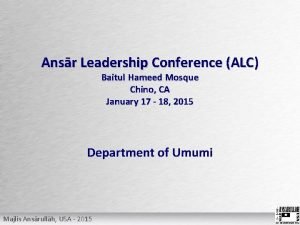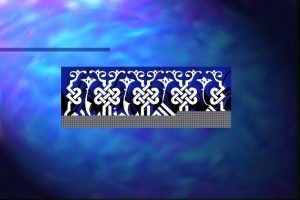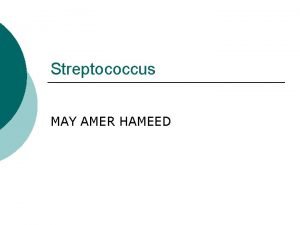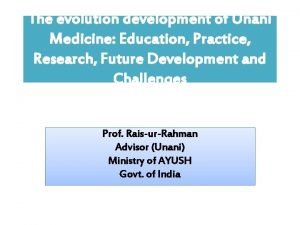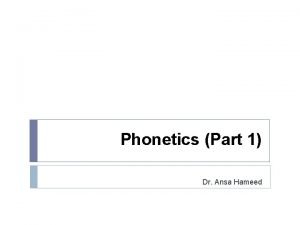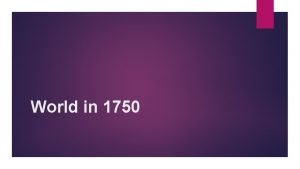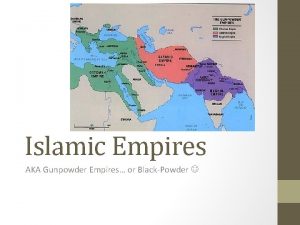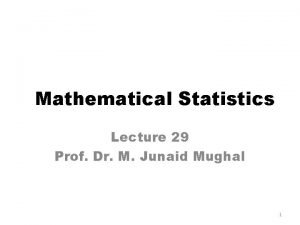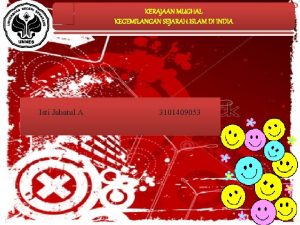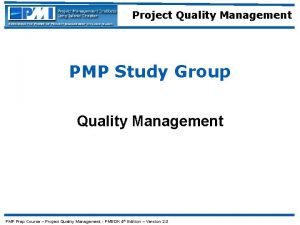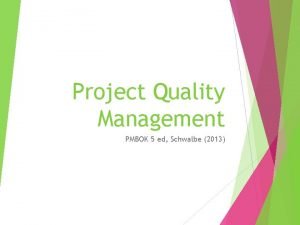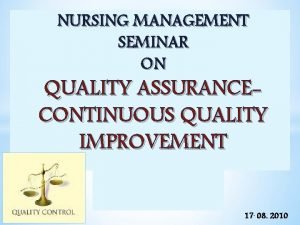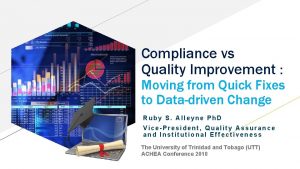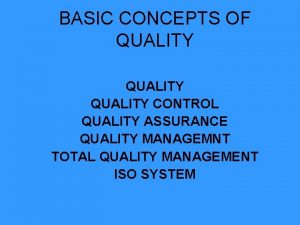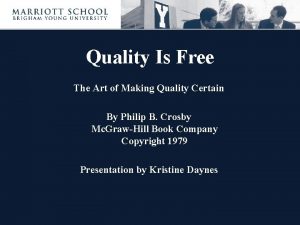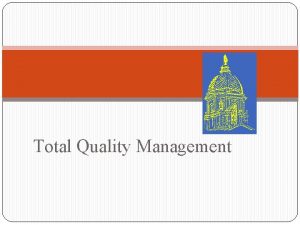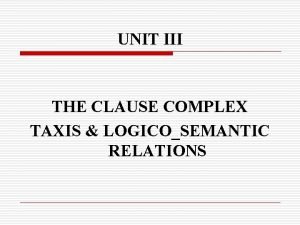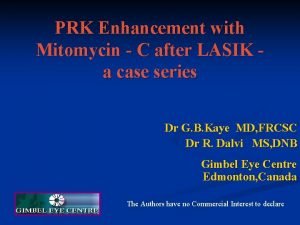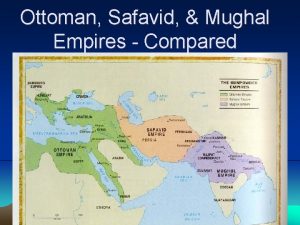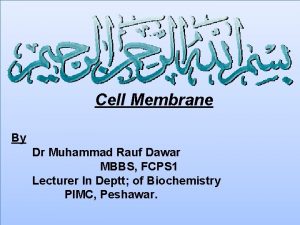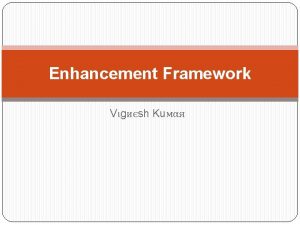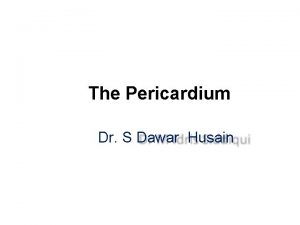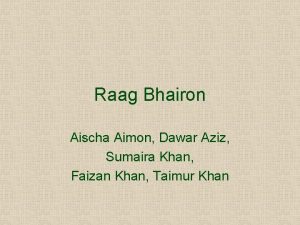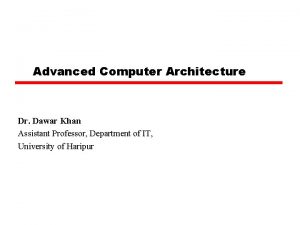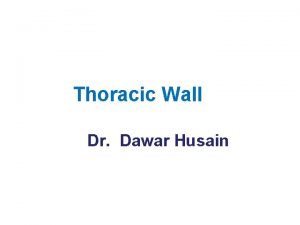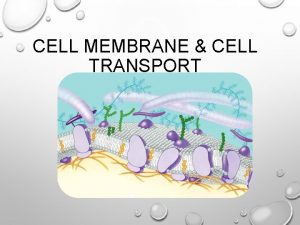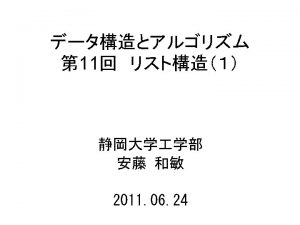Quality Enhancement Cell Dr Dawar Hameed Mughal Director








































- Slides: 40


Quality Enhancement Cell Dr. Dawar Hameed Mughal Director (October 23, 2013)

Establishment of QEC • The QEC at UVAS was established in Dec, 2006 • First Director assumed the charged in Feb, 2007 • Staff hiring was done in June 2007

Vision and Mission of QEC-UVAS Vision • To achieve excellence in academic standards in attaining the status of world class renowned institution Mission • To ensure and improve quality of academic programs through implementing internationally acclaimed academic quality assurance processes to develop our students for meeting the current challenges of the market. Globally competitive quality education is what we strive for. Honoring the team, valuing the students, and following the golden principles of education is our philosophy

Organization Chart

QEC Staff • • • Dr. Dawar Hameed Mughal (Director) Dr. Muhammad Asif (Deputy Director) Muhammad Hafeez (Assistant) Usman Javed (Data Analyst) Muhammad Amjad Khan (Qasid)

Objectives Of QEC • To instill scientific, objective based education and play a creative role in response to emerging professional challenges towards Veterinary, its ancillary professions and the community • To ensure quality education at the University under the umbrella of Quality Assurance Agency of H EC • To Identify and rectify the gaps hampering imparting quality education

Objectives Of QEC • To build the capacity of the faculty according to the modern lines • To establish the standard parameters for quality education, training, assessment and evaluation • To identify the modern tools in teaching and research and incorporate it in education system as and when needed

Journey of QEC-UVAS • Initiated Teachers Evaluation in July and September 2007 • Manual entries of the forms in IT developed software • Employer survey conducted in 2007 -2008 • In 2007, six new programs were started • Alumni survey was conducted in 2007 -08

• Faculty Survey was also started in 2007 -08 • Research progress review form were started in 2007 • Evaluation process was assigned to the Program Teams • QEC prepared reports and submitted it to concern Chairman/Director • In 2008, Self Assessment (SA) Process was started

• In Nov, 2009 online examination system was initiated • In Feb, 2010 Course Teaching Software was implemented • In Feb, 2010 online teachers’ evaluation/course evaluation by the students was started for all programs • 72 faculty members were evaluated by using 6121 forms in 39 courses (DVM) in first teachers’ evaluation by the students

Under-graduate Programs • DVM • BS (Hons. ) Microbiology (2007) • BS (Hons. ) Bioinformatics and Biotechnology (2007) • BS (Hons. )Dairy Technology (2007) • BS (Hons. ) Poultry Science (2007) • BS (Hons. ) Fisheries and Aquaculture(2007) modifies as BS (Hons. ) Applied Zoology (2011)

Under-graduate Programs • MBA (2007) • Pharm D (2008) • BS (Hons. ) Environmental Sciences (2010) • BBA (Hons. ), (2011) • BS (Hons. ) Nutrition and Dietetics (2012) • BS (Hons. ) Biochemistry (2013) • M Sc Zoology (2013)

Post-graduate Programs M Phil Microbiology Epidemiology & Public Health Pharmacology & Toxicology Fisheries & Aquaculture Pathology Animal Nutrition Physiology Molecular Biology & Biotechnology Parasitology Poultry Production Anatomy & Histology Forensic Sciences Theriogenology Livestock Production Food Science & (ABG + LM) Human Nutrition CMS ( Medicine + Surgery) Dairy Technology Wildlife & Ecology Bioinformatics Pharmaceutical Sciences

Post-graduate Programs Ph D Microbiology Epidemiology & Public Health Pharmacology & Toxicology Fisheries & Aquaculture Pathology Animal Nutrition Physiology Molecular Biology & Biotechnology Parasitology Poultry Production Anatomy & Histology Wildlife & Ecology Theriogenology Livestock Production (ABG + LM) Food Science & Human Nutrition Dairy Technology CMS ( Medicine + Surgery)

QEC Forms • Teachers’ evaluation (students) – Theory – Practical – Clinics • Course evaluation(students) • Course review report (faculty) • Graduating students survey (students)

QEC Forms • Research progress review form (Post graduate students) • Alumni survey • Employer survey • Faculty survey

Program Team (PT) • Each Department/Institute Head is chief member of PT • Each department has a focal person of QEC which is nominated by the head and notified by the registrar office/QEC after the approval from the Vice Chancellor

Assessment Team (AT) • The assessment team is proposed by the Director QEC and is finalized/approved by the Vice Chancellor • The team includes senior faculty members and one subject expert may be from within or outside university

Mechanism of SA • The QEC initiates the SA process • Program Team (PT) collects data for preparing selfassessment report (SAR) about the program • The department submits the SAR to the QEC through the concerned Dean/Ho. D • The QEC reviews the SAR within one month to ensure its preparation as per required format • The QEC sends recommendations to Vice Chancellor for the formation of AT • The Vice Chancellor finalizes the AT

• The AT comprises of 2 -3 members from within or outside the university • The QEC plans and schedules the AT visit • The AT conducts the assessment, submits a report and presents its findings in an exit meeting, attended by the QEC, Dean and PT and faculty members • The QEC submits an executive summary to the Vice Chancellor based on the AT findings

• The Department/Institute prepare and submit an implementation plan (IP) to QEC based on the AT findings • The QEC follows up on the IP to ensure that departments are adhering to the IP • The academic department must inform the QEC each time a corrective action is implemented • QEC review the implementation plan once a semester to assess the progress of IP

Model Departments 1. 2. 3. 4. 5. 6. 7. 8. 9. Epidemiology and Public Health Fisheries and Aquaculture Wildlife and Ecology Social Sciences Microbiology Theriogenology Pathology Poultry Production Pharmacology and Toxicology

Model Departments 10. Economics and Business Management 11. Livestock Production 12. Clinical Medicine and Surgery 13. Anatomy and Histology 14. Food and Nutrition (Animal Nutrition) 15. Statistics and Computer Science 16. Physiology 17. Parasitology 18. Institute of Biochemistry and Biotechnology

Departments / Institutes Undergoing SA Exercise 1. 2. 3. 4. 5. 6. 7. Dairy Technology (DVM Program) Fisheries and Aquaculture (BS Program) Dairy Technology (BS Program) Microbiology (BS Program) Poultry Production (BS Program) Business Management (MBA Program) Biochemistry and Biotechnology (BS Program)

Quality of Assessment, control and Improvement • The QEC conducts teacher and course evaluation by the students at the end of each semester • The teacher evaluation is sent to the concern teacher, Chairmen/Director and Dean • The Chairman/Director calls a meeting on this assessment and discuss the weaker areas without mentioning the name of teachers and come up with a solution that how improvements can be made • Each department sends the minutes of meeting to QEC

Satisfactory Assessment • Initially, the assessments were narrow scoped • Now, the system is getting mature and depth is coming in assessments, with a focus towards real issues • The main reasons for unsatisfactory assessment was non-clarity of the assessment procedures and their importance

Steps Taken Towards Improvements • The keen interest of the Vice Chancellor in QEC activities helped a lot • The Vice Chancellor himself started visits of the departments • Regular interaction with the departments by QEC • The students’ counseling started • Teachers’ trainings were increased • Introduced trainings for the focal persons

Weaker Areas Identified Based on Assessment Reports • • Electricity issues Lecture rooms availability Shortage of equipments/glassware Faculty need training Lack of senior faculty in the departments Inadequate laboratory manuals Lack of hand on work opportunities

Concept of Self Assessment • Initially, the faculty was very reluctant to cooperate • As a result of continuous efforts, their cooperation has increased • Departments have started realizing that SA is in their own favor • Quality conscious faculty is always eager to know feed back from the students

Achievements • • • Industry is responding to our graduates Enrollment of the students increased New programs have been started Improved curriculum Increased departmental/faculty board of studies meetings

Achievements • Examination system improved • Ph. D faculty increased • Developed online teacher/course evaluation software : : UVAS UMS: : • Developed Course Teaching Software (CTS) : : UVAS UMS: : • Developed online students’ attendance system

UVAS Ranking • Ranked 3 rd “Agriculture Category” (2010, 2012) Ranking based on research out put • – – – 21 out of 93 HEIs in 2010 (overall) 5 th out of 56 HEI in 2010 (Life Sciences) 19 out of 111 HEIs in 2011 -2012 (overall) • Got “W” category QEC by HEC – 91. 0 % (December 2012) – 93. 3% (June 2013)

Lessons Drawn • Quality is the key of success, but it never comes over nightly • Slowly and gradually, we are succeeded to reduce the resistance of faculty in the adoption of quality procedures • During the semester, faculty is not willing to do admin duties – Faculty feel QEC activities as extra burden on them – No incentive for PT/AT for QEC activities – QEC assignments are not included in their workload

Lessons Drawn • Students seriousness is always questionable • Assessment procedures are delayed too much due to teaching schedule • Faculty think that QEC is responsible for the solution of their problems • The QEC is sole responsible for the Quality of the institute • Issues/Improvements are highlighted and raised at appropriate level • Self accountability is increased

Level of Satisfaction and Future Reforms • Overall level is satisfactory Administrative Structure: • Director QEC must be over the rank of a Dean to implement all assessment procedures Otherwise • Dean of the Faculty should act as Dean Quality Assurance • Head of the Department/Institute must act as Director Quality Assurance and responsible for assessment procedure and uplifting the quality standards

Level of Satisfaction and Future Reforms Procedure Adopted: • Currently, all assessment procedures are initiated by QEC • Assessment procedures may be initiated by the concern Head of the Department/Institute (Director QA) in all programs • Assessment cycle may be repeated in all programs after every 2 -3 years

Level of Satisfaction and Future Reforms HEC Forms • Repetition of information • Course review report • Survey of Departments offering Ph. D programs Self Assessment Manual • Repetition of information • Irrelevant criterions • HEC demands all criterions to be covered in SAR • SA Manual need to be revise or SAR need to be converted into IP • HEC QEC ranking system need to be revised

Membership of Quality Associations/Networks • Quality Management Division, University of Gadjah Mada, Indonesia • Society of Quality Assurance, USA • Talloires Network

THANK YOU
 Anuj dawar
Anuj dawar Chino masjid
Chino masjid Mirza definition
Mirza definition Asm microbelibrary.org
Asm microbelibrary.org Hakim abdul hameed
Hakim abdul hameed Hameed pronunciation
Hameed pronunciation Mughal empire 1450 to 1750
Mughal empire 1450 to 1750 Millet system
Millet system Chapter 2 the muslim world expands
Chapter 2 the muslim world expands Mughal empire location
Mughal empire location Shahjahanabad city planning
Shahjahanabad city planning Chapter 18 section 3 the mughal empire in india
Chapter 18 section 3 the mughal empire in india Chapter 18 section 3 the mughal empire in india
Chapter 18 section 3 the mughal empire in india Ottoman safavid and mughal empire map
Ottoman safavid and mughal empire map Gunpowder empires map
Gunpowder empires map How did the ottoman safavid and mughal empires arise
How did the ottoman safavid and mughal empires arise Shiism
Shiism First mughal emperor of india
First mughal emperor of india Birth of prince salim
Birth of prince salim Kathak in mughal period
Kathak in mughal period Gunpowder empires characteristics
Gunpowder empires characteristics Dowmfall
Dowmfall Mughal empire
Mughal empire Who was babur
Who was babur Akansha jahangir
Akansha jahangir Dr junaid mughal
Dr junaid mughal Kerajaan mughal merupakan kelanjutan dari kesultanan
Kerajaan mughal merupakan kelanjutan dari kesultanan Quality assurance vs quality control
Quality assurance vs quality control Plan quality management pmp
Plan quality management pmp Pmbok quality management
Pmbok quality management Quality assurance cycle in nursing
Quality assurance cycle in nursing Compliance vs quality
Compliance vs quality Basic concepts of quality
Basic concepts of quality Known as the fun uncle of the quality revolution
Known as the fun uncle of the quality revolution Quality is free
Quality is free Old quality vs new quality
Old quality vs new quality Complex sentence examples
Complex sentence examples Libby bergman
Libby bergman Digital print enhancement
Digital print enhancement Prk enhancement after lasik
Prk enhancement after lasik Nmos inverter with resistive load
Nmos inverter with resistive load

